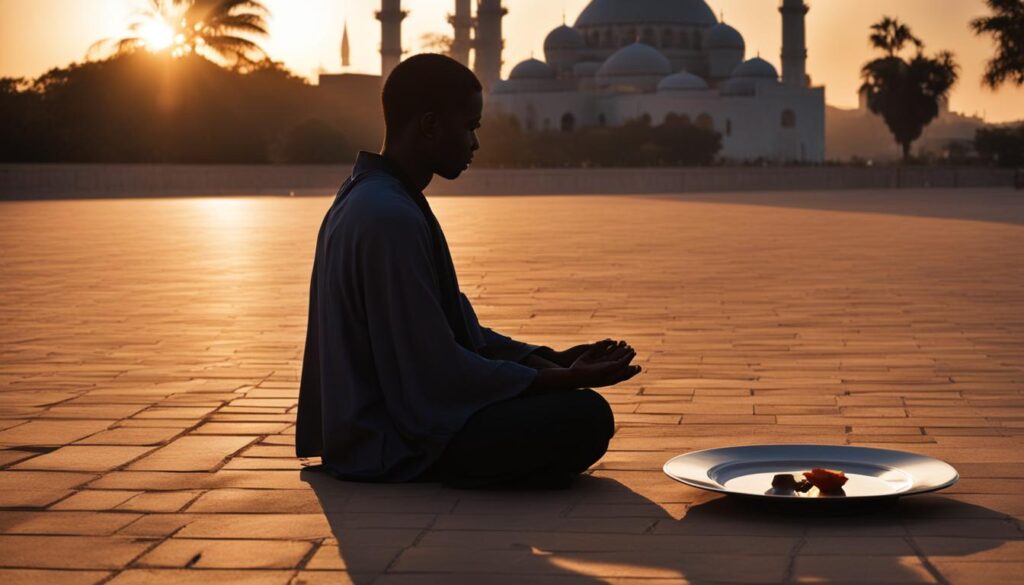In Islam, the relationship between prayer and fasting is significant. While there is no specific rule against praying before breaking your fast, it is recommended to break the fast before praying. Prayer and fasting are considered essential spiritual practices that promote self-discipline and strengthen one’s relationship with God. Fasting is a time for deep contemplation of one’s relationship with God, extra prayer, increased charity, and intense study of the Quran. It is a time of celebration and joy, to be spent with loved ones, followed by the breaking of the fast with a meal called iftar.
Key Takeaways:
- Prayer and fasting have a close connection in Islam.
- Breaking the fast before praying is recommended.
- Fasting is a time for self-reflection and spiritual growth.
- Extra prayer, charity, and Quranic study accompany fasting.
- Iftar is a celebratory meal that breaks the fast.
Continue reading to discover the significance of Ramadan and fasting in the next section.
The Significance of Ramadan and Fasting
Ramadan is a sacred and highly significant month for Muslims worldwide. It is a time of spiritual discipline, self-reflection, and deepening one’s connection with Allah. Fasting during Ramadan is an essential component of this month, and it holds immense power in the lives of believers.
During Ramadan, Muslims abstain from food, drink, smoking, and sexual activity from dawn to sunset. This act of fasting serves multiple purposes. Firstly, it reminds individuals of their human frailty and dependence on Allah. By refraining from worldly desires, Muslims are reminded of their spiritual needs and the importance of nourishing their souls through prayer and contemplation.
Fasting is a form of spiritual discipline that helps purify the mind, body, and soul. It encourages self-control, resilience, and patience. By refraining from food and drink, individuals learn to discipline their physical urges and focus on their spiritual development.
“Fasting is a shield; it protects you from the Hellfire and prevents your tongue, eyes, and limbs from committing sinful acts.” – Prophet Muhammad (peace be upon him)
Furthermore, fasting during Ramadan fosters empathy and compassion. By experiencing hunger and thirst, Muslims develop a greater understanding of the struggles faced by the less fortunate. This awareness inspires acts of charity and generosity, as Muslims strive to alleviate the suffering of those in need.
The power of prayer and fasting during Ramadan is undeniable. It is a time of immense spiritual growth and self-reflection. Through fasting, Muslims attain a heightened state of consciousness and a deeper connection with Allah. It is an opportunity to seek forgiveness, find inner peace, and strengthen one’s faith.

Table: The Power of Prayer and Fasting
| Benefits | Description |
|---|---|
| Enhanced spirituality | Fasting and prayer create a deeper connection with Allah and promote spiritual growth. |
| Improved self-discipline | Through abstaining from food and drink, individuals develop self-control and discipline. |
| Increased empathy | Fasting fosters compassion for the less fortunate, promoting empathy and a desire to help others. |
| Heightened self-reflection | The act of fasting encourages individuals to reflect on their actions, seek forgiveness, and make positive changes. |
| Strengthened faith | Prayer and fasting during Ramadan inspire a renewed sense of devotion and a stronger bond with Allah. |
Prayer and Fasting Rituals During Ramadan
During the holy month of Ramadan, Muslims observe various rituals that are integral to their spiritual practice. These rituals help create a sense of unity and devotion among believers, as well as deepen their connection with Allah. Here are some significant prayer and fasting rituals that Muslims follow during Ramadan:
Suhur:
Before dawn breaks, Muslims wake up to partake in suhur, the pre-dawn meal. This meal holds great importance as it provides the energy needed to sustain oneself throughout the day while fasting. Suhur typically consists of nutritious foods that provide both sustenance and hydration to help individuals endure the fast until sunset. It is recommended to eat a pre-dawn meal that is filling but also healthy and balanced, ensuring that it provides the necessary nutrients to stay energized.
Iftar:
At sunset, Muslims break their fast with a meal known as iftar. This is a joyous occasion that brings families and friends together to share a meal after a day of fasting. The iftar meal traditionally begins with dates and water, following the sunnah (practice) of the Prophet Muhammad. It is customary to break the fast with these simple foods before engaging in a more substantial meal. Muslims often gather at the mosque for communal iftars, where the community comes together to break their fast and pray together.
Taraweeh Prayers:
Another significant ritual during Ramadan is the Taraweeh prayers. These are special prayers performed at night in congregation at the mosque or at home. Taraweeh prayers consist of reciting portions of the Quran and engaging in prolonged congregational prayers. These prayers provide an opportunity to seek spiritual reflection and inner peace, as well as strengthen the bond with Allah. Many Muslims strive to complete the recitation of the entire Quran during the month of Ramadan by dividing it into thirty parts, reciting one part each night.
| Ritual | Description |
|---|---|
| Suhur | Pre-dawn meal to sustain individuals throughout the day while fasting. |
| Iftar | Meal to break the fast at sunset, often shared with family and friends. |
| Taraweeh Prayers | Special congregational prayers performed at the mosque or at home during Ramadan nights. |
These rituals and practices form an essential part of the Ramadan experience for Muslims worldwide. They not only bring spiritual fulfillment but also foster a sense of community and togetherness. Through suhur, iftar, and Taraweeh prayers, Muslims embrace the essence of Ramadan, striving to nourish their souls and strengthen their relationship with Allah.
The benefits of prayer and fasting
Prayer and fasting offer numerous benefits that contribute to spiritual growth and personal development. By engaging in these practices, individuals can embark on a transformative journey that includes self-reflection, discipline, and humility.
One of the primary benefits of prayer and fasting is the opportunity for deep self-reflection. During these periods of spiritual devotion, individuals have the chance to introspect, assess their actions, and seek self-improvement. This introspection fosters a sense of awareness and mindfulness, enabling individuals to identify areas for personal growth and make positive changes in their lives.
The practice of prayer and fasting also promotes discipline. By abstaining from worldly desires and focusing on spiritual nourishment, individuals develop self-control and willpower. This discipline extends beyond the act of fasting itself and can positively impact other areas of life, such as maintaining healthy habits, managing emotions, and achieving personal goals.
“Through prayer and fasting, we learn to prioritize our spiritual needs and cultivate a deeper connection with the divine.”
Furthermore, prayer and fasting cultivate humility. By voluntarily experiencing the discomfort of hunger and thirst, individuals gain a profound appreciation for the blessings they have and develop empathy for those who are less fortunate. This humility strengthens a sense of gratitude and empathy, encouraging individuals to extend kindness and support to others in need.
In summary, prayer and fasting are not only religious rituals but also powerful tools for personal growth and spiritual development. These practices offer the benefits of self-reflection, discipline, and humility, enabling individuals to deepen their connection with God and experience inner peace. By prioritizing prayer and fasting, individuals can embark on a transformative journey of self-discovery and spiritual enlightenment.
Conclusion
Prayer and fasting are foundational practices in Islam that promote spiritual growth and deepen one’s connection with God. While there is no strict rule against praying before breaking the fast, it is advisable to break the fast first. These practices are observed during the sacred month of Ramadan, a time of fasting from dawn to sunset, self-reflection, and increased devotion.
By following a prayer and fasting guide, individuals can ensure a meaningful and fulfilling experience during Ramadan. This guide provides comprehensive instructions on how to fast and pray, allowing believers to engage in the rituals and gain the maximum benefits from these practices. It offers valuable insights into suhur and iftar, the timings of prayers, and the significance of Taraweeh prayers.
Through prayer and fasting, individuals can cultivate discipline, self-reflection, and humility. These practices provide dedicated time for spiritual nourishment and mindfulness, leading to a stronger spiritual bond and inner peace. By embracing prayer and fasting, believers can embark on a transformative journey, deepening their faith and experiencing a renewed sense of devotion.
As you embark on your prayer and fasting journey during Ramadan, let the comprehensive prayer and fasting guide be your companion. Discover the power of prayer and fasting as you immerse yourself in this sacred time of self-reflection, discipline, and spiritual growth. May your Ramadan be filled with blessings and a strengthened connection with the divine.
FAQ
Do I break my fast before or after prayer?
It is recommended to break the fast before praying.
What is the significance of Ramadan and fasting?
Ramadan is the most sacred month for Muslims, and fasting serves spiritual and social purposes such as self-discipline, compassion, and focus on one’s relationship with God.
What are the prayer and fasting rituals during Ramadan?
Muslims wake up before dawn for suhur, perform the morning prayer, fast from dawn to sunset, break the fast with iftar, and may attend Taraweeh prayers.
What are the benefits of prayer and fasting?
Prayer and fasting promote spiritual growth, discipline, self-reflection, empathy, inner peace, clarity, and a stronger spiritual bond.
Where can I find a prayer and fasting guide?
To learn more about how to observe prayer and fasting during Ramadan, consult a comprehensive prayer and fasting guide for a meaningful and fulfilling experience.








